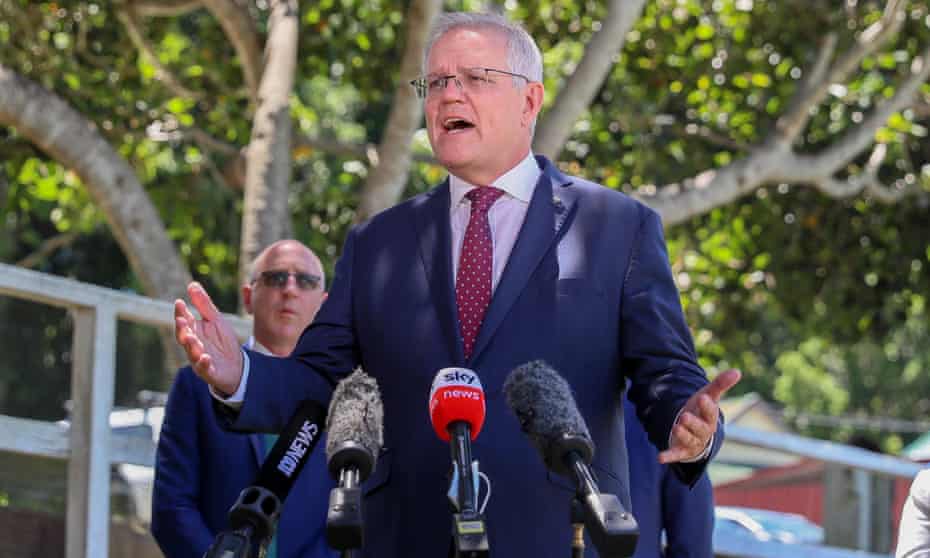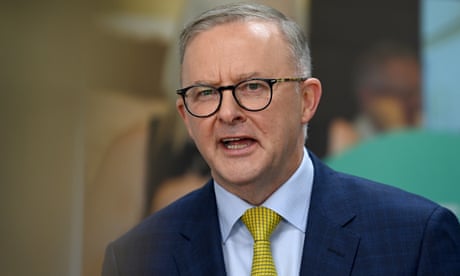Extract from The Guardian
The Morrison government has hit back at reports that Coalition seats received nearly $1.4bn more than Labor seats over three years. How does their defence stack up?

Prime minister Scott Morrison fronts a press conference on Wednesday, where he was quizzed about the discrepancy in grants awarded to Coalition and Labor seats.
Political reporter Katina Curtis and senior economics correspondent Shane Wright, from the Nine newspapers, spent two months compiling, cross-checking and analysing data on government grants.
They focused on discretionary grants, overseen by MPs and ministers.
They found that the 19,123 grants overwhelmingly favoured Coalition-held electorates. Coalition seats got three times as much – $1.9bn over the past three financial years compared with about $530m for Labor seats. Other money was thrown at independent seats.

It’s the latest chapter in an ongoing story about how taxpayer money is seemingly being used for political purposes. Previous chapters include the car park rorts, and the sports rorts. Subplots include former NSW premier Gladys Berejiklian conceding “we throw money at seats to keep them”.
The federal government’s spin machine went into overdrive. Do their counter-claims deserve traction?
‘A very good local member’
Asked about Peter Dutton’s seat, Dickson, which received more than $43.6m (compared to Lilley, a neighbouring Labor seat, which received less than a million), prime minister Scott Morrison said Dickson “must have a very good local member”.
While everyone expects MPs to advocate for their community, the application process does not, in fact, list “having a very good local member” as a reason for doling out money. They tend to focus on the merit of the project, not the merit of the local MP.
Lilley MP Anika Wells pointed out that she spent six months putting together an infrastructure budget submission. “And not a single one of those items in an eight-page submission has been delivered,” she told ABC radio.
“The argument of a good local member simply does not fly … unless the PM knows how every one of the members of parliament operate,” he said. “Is the new member for Warringah brilliant?”
(Former prime minister Tony Abbott’s seat, Warringah, had a respectable $24m thrown at it – which was not enough to stop independent Zali Steggall winning it).
It’s ‘selective’ analysis
Morrison said the reporting was a “predictively selective analysis of 11 programs out of 1,700”. “These analyses have looked at very, very small numbers of those programs,” he said.
The finance minister, Simon Birmingham, echoed that statement.
“I do dispute the figures in that it’s a very selective analysis. It’s 11 grants programs out of some 1,700 grants programs,” he said.
It’s true that the 11 programs were selected; they were selected because they are the discretionary grant programs. They are overseen by local MPs or ministers instead of departments.
“We chose the 11 programs that are decided on want, not need,” Wright said.
He makes the point that many of the grants were for legitimate projects, but were delivered along political lines. Others were more “egregious”, such as chook sheds or turtle ponds.
They’re for rural and regional areas
Morrison said the programs were predominantly for rural and regional areas, with money going to drought-affected communities.
Birmingham also said the grants favoured rural and regional seats, and that “these are communities the Coalition holds the vast majority of electorates in”.
But wait, there’s more data. Nine Liberal electorates east of the Yarra in Melbourne received more than $86m, while nine Labor-held seats on the other side got just $14m.
Wright said their analysis excluded bushfire grants, which would have distorted the outcome. “We did include drought, but if you remove (the drought communities program) the difference becomes $1.6bn for government seats and $500m for Labor,” he said.
They do it too …
Birmingham pointed to Labor leader Anthony Albanese, saying he had announced swimming pools for safe Labor seats. He’s right that pork barrelling happens across party lines, but it’s a flimsy argument when the data proves how that has been happening in reality, under the party that is actually in government.
Morrison tried to flip the narrative to one about the Coalition keeping election promises. “When we make a commitment, we keep it,” he said. Remember how Berejiklian said “we throw money at seats to keep them”?
Wright said: “Budgets are about choices and these are the choices that have been made by a government that is clearly directing grants.”
No comments:
Post a Comment